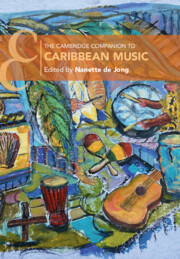Book contents
- The Cambridge Companion to Caribbean Music
- Cambridge Companions to Music
- The Cambridge Companion to Caribbean Music
- Copyright page
- Dedication
- Contents
- Figures
- Contributors
- Foreword
- Acknowledgements
- 1 Introduction to the Caribbean and Its History
- 2 Race and Transculturation
- 3 Salsa Soundings
- 4 Blackness and Identity
- 5 From the Island to Global Stages
- 6 Investigating the Caribbean’s African Past
- 7 Reframing Diasporic Belonging
- 8 Competition, Conflict, and Cooperation
- 9 Uncovering Hidden Histories of Meaning
- 10 The Foundations of Rap Music and Post-colonial Emancipation
- 11 Konpa, Zouk, and the Politics of World Music
- 12 Globalisation in the Reggae and Dub Diaspora
- 13 Musical Orality and Literacy in the Transmission of Knowledge and Praxis
- 14 Narratives of Return
- 15 Decolonising Caribbean Imaginaries
- Index
- References
6 - Investigating the Caribbean’s African Past
Kokomakaku Stickdance from Curaçao
Published online by Cambridge University Press: 17 September 2022
- The Cambridge Companion to Caribbean Music
- Cambridge Companions to Music
- The Cambridge Companion to Caribbean Music
- Copyright page
- Dedication
- Contents
- Figures
- Contributors
- Foreword
- Acknowledgements
- 1 Introduction to the Caribbean and Its History
- 2 Race and Transculturation
- 3 Salsa Soundings
- 4 Blackness and Identity
- 5 From the Island to Global Stages
- 6 Investigating the Caribbean’s African Past
- 7 Reframing Diasporic Belonging
- 8 Competition, Conflict, and Cooperation
- 9 Uncovering Hidden Histories of Meaning
- 10 The Foundations of Rap Music and Post-colonial Emancipation
- 11 Konpa, Zouk, and the Politics of World Music
- 12 Globalisation in the Reggae and Dub Diaspora
- 13 Musical Orality and Literacy in the Transmission of Knowledge and Praxis
- 14 Narratives of Return
- 15 Decolonising Caribbean Imaginaries
- Index
- References
Summary
This chapter introduces kokomakaku, a stickfight ritual from the Dutch island of Curaçao. Documenting its evolution and development, the chapter shows how music can be used to reconstruct a possible historical, social and cultural timeline of an island. Kokomakaku embodies the cultural encounters and conflicts that mark Curaçao’s past and present, its development, likewise, representing localised struggles for status and self-definition.
- Type
- Chapter
- Information
- The Cambridge Companion to Caribbean Music , pp. 82 - 94Publisher: Cambridge University PressPrint publication year: 2022

